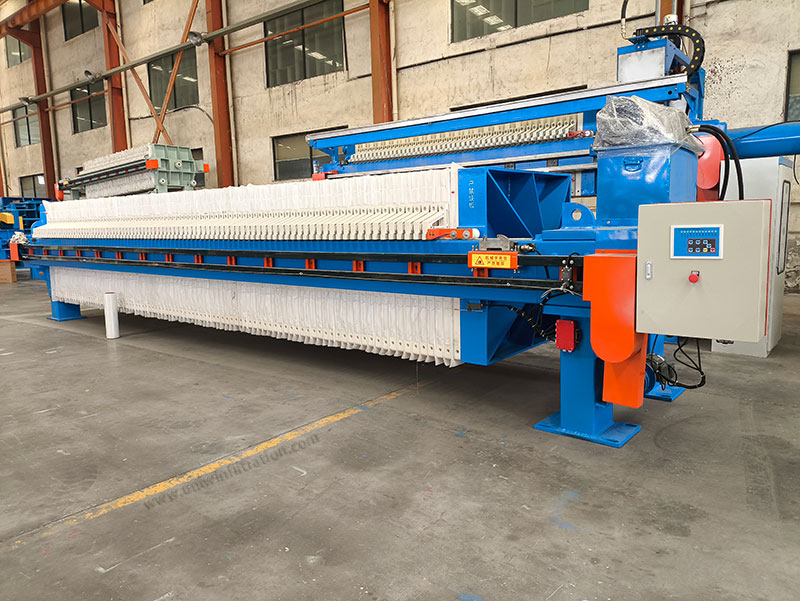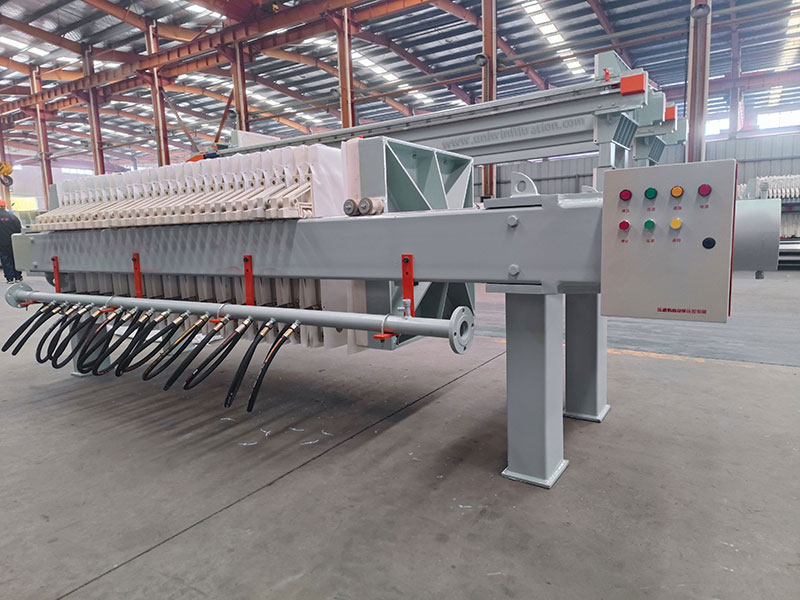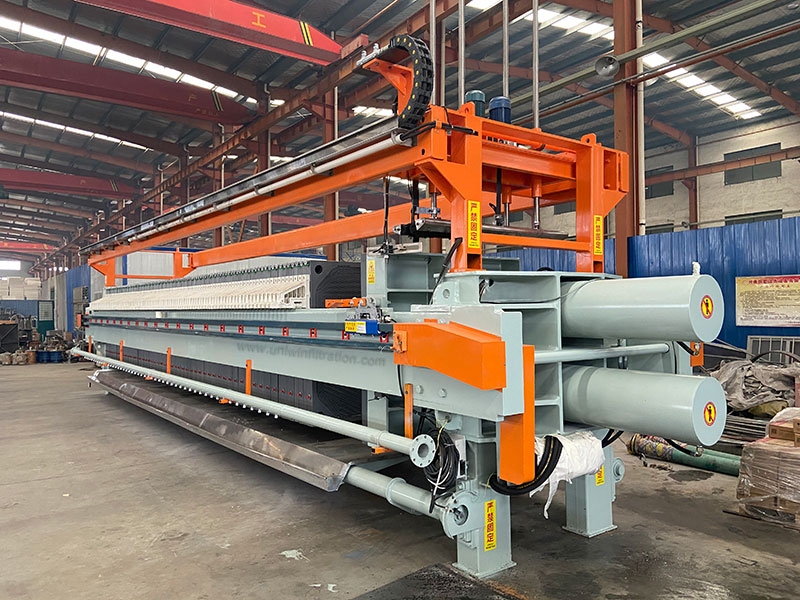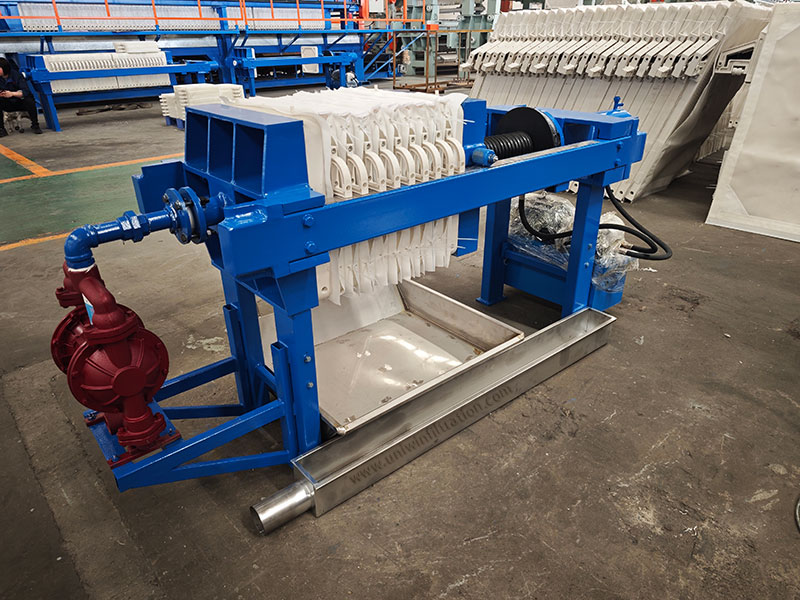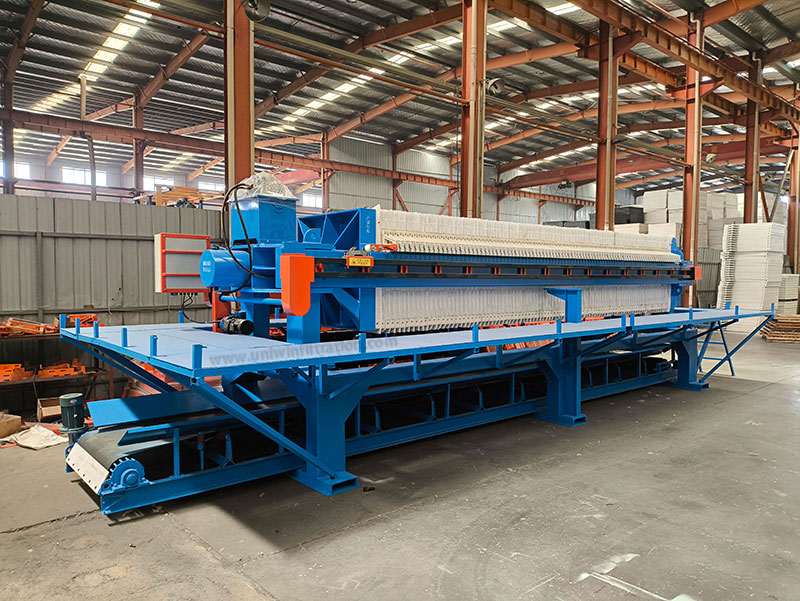Chamber Filter Press
As one of the most common types of filter presses, chamber filter presses are widely used. Every two filter plates form a filter chamber to filter the material. Chamber filter presses have unique advantages over other filter presses. The following is a detailed introduction to chamber filter presses.
What is a Recessed Chamber Filter Press?
The recessed chamber filter press is a solid-liquid separation device known for its high-pressure filtration and compact structure. Its filter plates are arranged in a chamber shape, and a closed filter chamber is formed under the action of the hydraulic system, which can achieve rapid dehydration of high-concentration suspensions and high-solid content filter cake formation in a short time.
Compared with other types of filter presses, the chamber structure is not only more sealed and stable in operation, but also has a high filter cake density and low operating cost, which is particularly suitable for processing high-viscosity materials such as sludge, ore slurry, and chemical slurry.
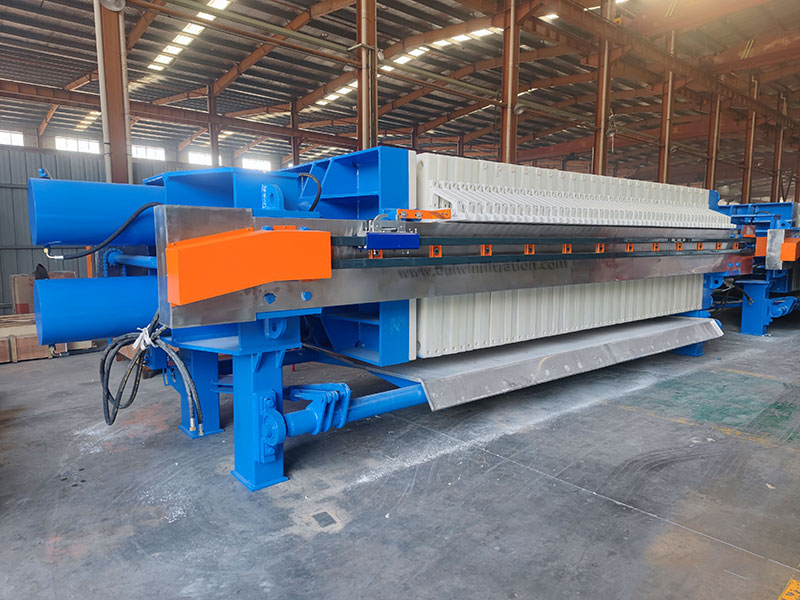
How Does a Chamber Filter Press Work?
Feeding stage
After the equipment is started, the hydraulic system presses the filter plates tightly and arranges them to form closed filter chambers. Through the feed pump, a suspension containing solid particles (such as sludge, ore pulp, chemical liquid, etc.) is injected into the filter chamber at high pressure. The slurry is evenly distributed in each filter chamber and is ready for filtration.
Filtration stage
Under the action of pumping pressure, the liquid seeps through the filter cloth and flows out of the equipment along the drainage channel of the filter plate to become filtrate. The solid particles are gradually accumulated in the filter chamber due to the interception effect of the filter cloth, forming a dense filter cake. At the end of this stage, the filter cake basically fills the entire filter chamber.
Unloading stage
After the filtration is completed, the hydraulic device releases the filter plate pressure, and the filter plates are automatically or manually pulled apart in turn. Since the filter cake has been separated from the filter cloth during the drying process, it can usually fall off naturally or be gently shaken off to complete the unloading process. The filter plate is then re-pressed and enters the next round of the filtration cycle.
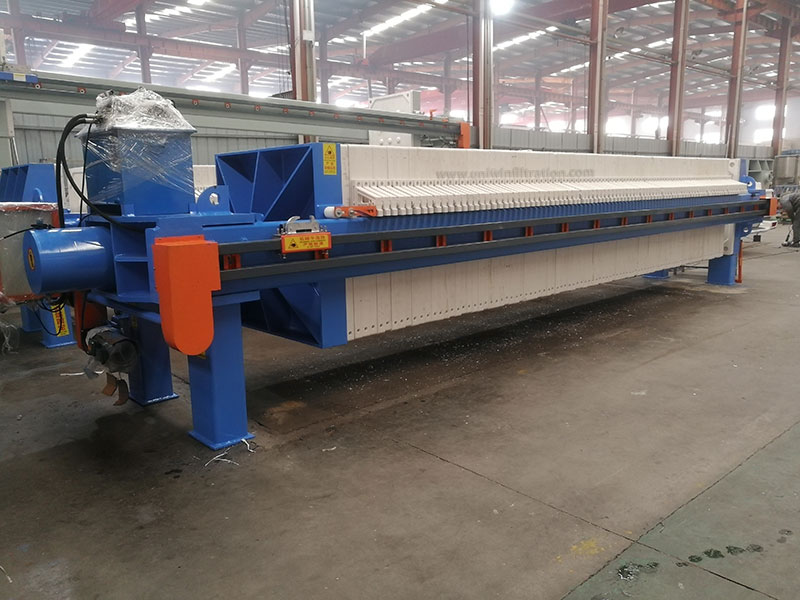
Recessed Plate Filter Press Parameters
| Model | Filter area(m2) | Plate size (mm) | Cake thickness (mm) | Filter chamber volume(L) | Plate Number (pcs) | Filtration pressure (Mpa) | Motor power (KW) | Weight (KG) | Dimensions (L*W*H) (mm) |
|---|---|---|---|---|---|---|---|---|---|
| XMY4/450-30U | 4 | 500*500 | 30 | 60 | 9 | ≤0.6 | 2.2 | 860 | 1950*700*900 |
| XMY6/450-30U | 6 | 91 | 14 | 910 | 2200*700*900 | ||||
| XMY8/450-30U | 8 | 121 | 19 | 960 | 2450*700*900 | ||||
| XMY15/630-30U | 15 | 700*700 | 226 | 18 | 1725 | 2640*900*1100 | |||
| XMY20/630-30U | 20 | 297 | 24 | 1993 | 2940*900*1100 | ||||
| XMY30/630-30U | 30 | 452 | 37 | 2360 | 3590*900*1100 | ||||
| XMY40/630-30U | 40 | 595 | 49 | 2788 | 4300*900*1100 | ||||
| XMY30/870-30U | 30 | 870*870 | 460 | 23 | 2580 | 3330*1400*1300 | |||
| XMY50/870-30U | 50 | 748 | 38 | 3318 | 4260*1400*1300 | ||||
| XMY60/870-30U | 60 | 902 | 46 | 3712 | 4700*1400*1300 | ||||
| XMY80/870-30U | 80 | 1210 | 62 | 4561 | 5580*1400*1300 | ||||
| XMY80/1000-30U | 80 | 1193 | 46 | 5259 | 5120*1500*1400 | ||||
| XMY100/1000-30U | 100 | 1473 | 57 | 5985 | 5800*1500*1400 | ||||
| XMY120/1000-30U | 120 | 1777 | 69 | 6776 | 6500*1500*1400 | ||||
| XMY100/1250-30U | 100 | 1250*1250 | 1468 | 36 | 6728 | 5020*1770*1600 | |||
| XMY160/1250-30U | 160 | 2341 | 58 | 8205 | 6450*1770*1600 | ||||
| XMY200/1250-30U | 200 | 2896 | 72 | 10851 | 7360*1770*1600 | ||||
| XMY250/1250-30U | 250 | 3650 | 91 | 12834 | 8600*1770*1600 | ||||
| XMY300/1500-30U | 300 | 1500*1500 | 5235 | 74 | 25526 | 8130*2200*1900 | |||
| XMY400/1500-30U | 400 | 6985 | 99 | 32074 | 9880*2200*1900 | ||||
| XMY500/1500-30U | 500 | 8735 | 123 | 38106 | 11560*2200*1900 |
Significant Advantages of Chamber Filter Press
A more airtight structure, more stable filtration
The filter plate of the chamber filter press is a closed chamber structure, which has strong sealing performance under the action of the hydraulic system, effectively avoiding filtrate leakage, and is suitable for high-pressure filtration conditions. Compared with the plate and frame filter press, the chamber structure has more reliable sealing, is not prone to leaking, and is more suitable for processing corrosive or highly polluting slurries.
High cake compactness and low moisture content
Due to the high compaction force and uniform pressure in the filter chamber, the cake is formed quickly and has a high compactness. The cake compactness is significantly better than that of continuous equipment such as belt filter presses. An optional diaphragm pressing module can be used to achieve secondary dehydration and further reduce the moisture content of the filter cake.
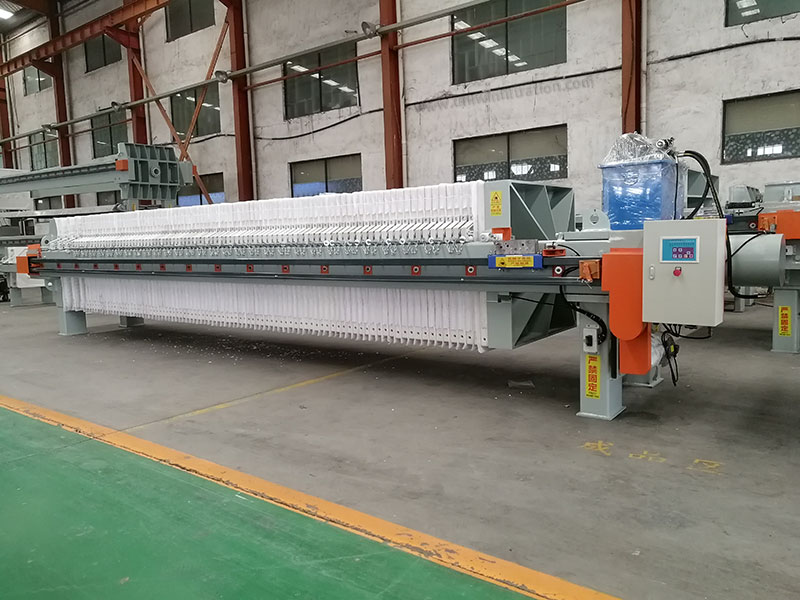
Compact footprint and lower energy consumption
Compared with continuous equipment such as belt filter presses, chamber filter presses have a more compact structure and occupy a smaller area per unit processing capacity.
Strong adaptability, suitable for a variety of materials
Can handle high-viscosity, high-concentration, fine-particle materials, such as industrial sludge, tailings slurry, chemical waste liquid, etc. The filter cloth can be replaced with different materials (polypropylene, polyester, nylon, etc.) to adapt to materials with different pH values, temperatures, and particle structures.
Supports automation upgrades and good intelligent control compatibility
Can integrate PLC control system to realize automatic compaction, feeding, squeezing, pulling, unloading and other processes. Suitable for unmanned sewage treatment stations, mine thickening workshops, and continuous process flows.

